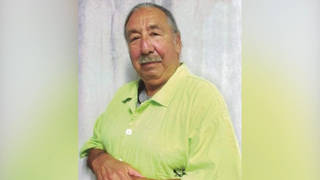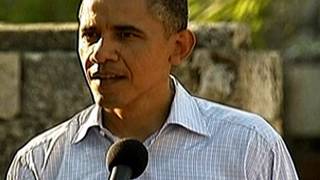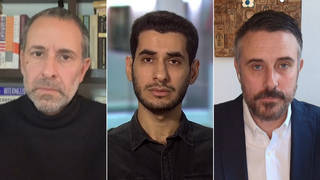
Related
Guests
- Ethan Nadelmannfounder and executive director of the Drug Policy Alliance. He’s joins us from Puerto Vallarta, Mexico, where he is attending the World Economic Forum’s regional Latin America meeting.
- Greg Grandinteaches Latin American history at New York University. He is the author of Empire’s Workshop: Latin America, the United States, and the Rise of the New Imperialism. His most recent book, Fordlandia, was a finalist for the Pulitzer Prize in history.
Links
- Drug Policy Alliance
- "Empire's Workshop: Latin America, the United States, and the Rise of the New Imperialism," by Greg Grandin (Metropolitan Books,
- "Fordlandia," by Greg Grandin (Metropolitan Books, Jun 2009)
- See all of Democracy Now’s coverage of Latin America
- See all of Democracy Now’s coverage of the Drug War
While the presidents of Guatemala, Colombia, Costa Rica and El Salvador have voiced support for an end to the drug war, President Obama rejected their calls for drug legalization during high-level talks at the Summit of the Americas in Colombia. Obama warned that legalization could lead to greater problems, but he expressed willingness to hold a discussion on drug policy. He also announced more than $130 million in aid for increasing security and pursuing narco-traffickers and drug cartels in Latin America. We speak with Ethan Nadelmann, founder and executive director of the Drug Policy Alliance. He joins us from Puerto Vallarta, Mexico, where he is attending the World Economic Forum’s regional Latin America meeting. We are also joined by Greg Grandin, author of “Empire’s Workshop: Latin America, the United States, and the Rise of the New Imperialism.” [includes rush transcript]
Transcript
AMY GOODMAN: We’re joined by Ethan Nadelmann, founder and executive director of the Drug Policy Alliance. He is joining us from Puerto Vallarta, Mexico, where he’s attending the World Economic Forum’s regional Latin American meeting, but here to talk about the significance of this meeting that has taken place, the Summit of the Americas in Cartagena, Colombia. We’re also joined by Greg Grandin of New York University, Latin American history professor there.
Ethan Nadelmann, the significance of President Obama’s stance against decriminalization or any kind of legalization of drugs, the position he’s taken on drug policy, and the leaders in Latin America, what they have said in response?
ETHAN NADELMANN: Well, I would not put that much significance into President Obama saying he’s opposed to legalization or decriminalization. That’s sort of the standard patter one expects from the politicians. They’ve been scared of their own shadows on this issue for a very long time.
But what’s much more important, Amy, is sort of looking at the tea leaves in all this stuff, because that’s why this summit is even—notwithstanding the nuance of the comments that were made—is really going to go down in a sort of historic way in terms of the transformation of the regional and global dialogue around drug policy. This is the first time ever that you’ve had a president, and for that matter, a vice president, saying this is a legitimate subject of discussion, the decriminalization, legalization. This is the first you’ve had a president saying that we’re willing to look at the possibility that U.S. drug policies are doing more harm than good in some parts of the world.
So, then you have the other leaders in the region. President Santos is, you know, as was just said before, an important ally of the United States, the former defense minister under President Uribe, somebody with a lot of credibility in waging a drug war. And he’s very focused on opening this up. And he’s not—you know, Time magazine has him on the cover this week as the emerging Latin American leader of significance. Otto Pérez Molina is very focused. Laura Chinchilla, the president of Costa Rica, came away saying she was very pleased that the Central American nations were benefiting because of the opening of this discussions. You have the funny situation of Evo Morales, the leftist leader of Bolivia, former head of the coca growers’ union, lecturing the United States about—essentially, sounding like Milton Friedman, that “How can you expect us to reduce the supply when there is a demand?” So there’s the beginning of a change here. I don’t think it’s going to be possible to put this genie back in the bottle.
AMY GOODMAN: Mexico’s President Felipe Calderón renewed calls on the United States, the world’s largest market for illegal drugs, to do more to curb consumption, as well.
PRESIDENT FELIPE CALDERÓN: [translated] Consumer countries—generally, the United States—should make a bigger effort to reduce consumption, and consequently, the extraordinary flow of economic resources that goes into the hands of the criminals.
AMY GOODMAN: And, of course, the Colombian president himself, as you mentioned, Santos, I mean, who’s been the recipient of millions in drug war money, still coming out for decriminalization. Ethan Nadelmann?
ETHAN NADELMANN: Well, you know, it’s an interesting time for President Calderón. I mean, his term ends later this year. He has waged the war on drugs for a long time. He’s pointing his finger at the United States and saying, “Why don’t you reduce your demand and stop sending so many guns down our way?” You know, at the summit, he expressed his appreciation for new organized crime agreements. But at the same time, he’s also floating and supporting this new discussion. When he was in the United States last year traveling around, he started saying, if the U.S. cannot reduce its demand for illegal drugs, it’s time for it to investigate, quote-unquote, “market alternatives,” which was seen correctly as codeword for legal alternatives. His foreign minister, Patricia Espinosa, in February said that now Mexico does in fact support a debate about the legalization issue. So, the real question, I think, with Calderón is, in the extended period in which he’s a lame duck, after the election in July but before he leaves office in December, will he speak out? Will he make an effort to speak more boldly, in the way that Santos and Otto Pérez Molina are right now?
And the other question is his likely successor, Peña Nieto, coming from the old PRI party, the one that dominated Mexican politics for something like seven decades. The general thought has been that he just wants to sort of put all this—go back to the old understanding between government and gangsters, that PRI model for so many years. But as one former president, César Gaviria, said to me recently, when somebody becomes president, they’re faced with a new situation. So the new president of Mexico, come next year, is going to have to decide, does he want to let this whole debate dwindle? Does he want to just keep suffering the consequences of a failed U.S. policy? Or does he want to actively participate in the initiatives of Santos, Otto Pérez Molina, Chinchilla and others?
AMY GOODMAN: And what about the fact that this is an election year, Ethan Nadelmann?
ETHAN NADELMANN: Well, it simply means that you’re not going to hear much of this in U.S. politics. I’ll be curious to see whether Fox News or Romney’s campaign try to pick on Obama even for the modest acknowledgments he made. But the interesting thing, of course, Amy, on this issue is that this is very much an issue that’s of the left and the right. As was said before, some of the leading proponents of drug policy reform in the region are coming from the right and the center-right, both the current presidents, Santos and Otto Pérez Molina, but also former presidents, like Cardoso, Gaviria and Zedillo from Brazil, Colombia and Mexico, who are the ones who spearheaded these important global commissions that helped open up the issue. In the United States, you know, the two lions of the conservative movement in the late 20th century, William Buckley and Milton Friedman, it’s in the Republican Party primaries that you hear libertarians like Ron Paul and Gary Johnson talking to this issue. You know, it’s people like former Secretary of State George Shultz or Frank Carlucci who are clearly opposed to the drug war. It’s Grove Norquist, the anti-talks partisan, who’s very much a committed opponent of the drug war. So this is very much a bipartisan issue. We’re not going to see the same sorts of sniping from left and right on this issue as on others. And I think that means that this debate is going to grow stronger and more bolder as a result.
AMY GOODMAN: Professor Greg Grandin, the alarming rate of drug-related violence in Central America that all are trying to deal with?
GREG GRANDIN: Yeah, I mean, it’s a direct consequence of Clinton’s Plan Colombia, which has telegraphed the violence up through—up from Colombia through Central America. It had the effect of breaking up the transportation cartels, but did little about production or consumption, so therefore just increased the incentive for cartels and gangs in Central America. This was a moment when these countries were coming out of these devastating civil wars, just trying to put their institutions, civil institutions, back together again. It was like a tsunami. And added to that was the disruptions, the dislocations of neoliberalism, first NAFTA and then the Central American Free Trade Agreement, which just created massive dislocation in the countryside and destroyed agrarian markets, and just, you know, both created this void and vacuum that the drug violence filled. I mean, these are really the two legacies of the Clinton administration.
I’m a little bit—little bit more pessimistic about the United States’s ability to respond to this. I mean, you know, the United States, what we’re seeing, what’s at play—what you see at the Summit of the America is really an international forum, foreign policy forum, that what’s on view is domestic political sclerosis. The three things the U.S. could do to improve its situation and its relation with Latin America—Cuba, normalize relation with Cuba; humanize its drug policy; and three, and then have a more kind of humane trade policy—what stops that is—and then also immigration, so four things—is domestic politics. I mean, we always have an election in the United States. There’s always short-term interests that mitigate any—against a rational long-term response. But then there’s also deep interests within the United States. There’s the military-industrial complex, which makes a lot of money on the drug war. There’s SOUTHCOM, whose whole reason for existence is the drug war in Latin America. I mean, it’s going to be a lot—it’s going to take a lot to kind of pry those interests off of this policy and lead to a more rational response, I think.
AMY GOODMAN: Ethan Nadelmann, you’re speaking to us now, not from Cartagena, but from Puerto Vallarta, Mexico, where you’re there for the World Economic Forum regional meeting. The significance of this, following Cartagena right now?
ETHAN NADELMANN: Well, it was planned before people knew that this was going to be on the issue of the Summit of the Americas, but I’ll be on a panel in a few days with the president of Guatemala, Otto Pérez Molina, with the assistant secretary of state in the U.S. for law enforcement matters in narcotics, William Brownfield, and with the Mexican interior minister, whose job it is to wage the drug war. So it’s notable that, in a forum like this, which mostly focuses on business issues, that this issue is on the agenda. It’s consistent, however, with the fact that you now see the legal business communities in places like Mexico City, Monterrey, Guatemala City, beginning to step up and say this isn’t working.
And I should also just say, Amy, I agree with the previous speaker: this is going to be very difficult to sort of bring this—keep this discussion going in an above-ground way. You know, there is a prison-industrial complex. There are vested interests and powerful bureaucracies that have spent decades trying to suppress and ignore this discussion. Already, the U.S. is trying to find ways to maneuver this discussion into places where it will get stuck in sorts of intellectual quagmires and go nowhere.
But I think that, on the other hand, people like Santos, Otto Pérez Molina and others are savvy enough and are investing enough of time, of their own energy, to keep this thing moving, to understand that civil society, the intellectuals, the drug policy experts need to be engaged, and that if we just turn this over to the governments’ drug czars or their foreign ministries, this thing will die. That’s where the U.S. wants it. The others know it has to expand out for it to be effective.
AMY GOODMAN: I want to thank you both very much for being with us, Ethan Nadelmann of the Drug Policy Alliance, speaking to us from Puerto Vallarta, Mexico, and Greg Grandin, teaches Latin American history at New York University, author of Empire’s Workshop: Latin America, the United States, and the Rise of the New Imperialism and Fordlandia, finalist for the Pulitzer Prize in history.
This is Democracy Now!, democracynow.org, The War and Peace Report. When we come back, the debate raging in election politics now about women’s work in the workplace both outside and inside the home. Stay with us.












Media Options